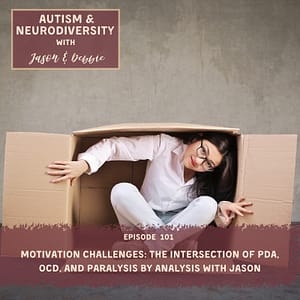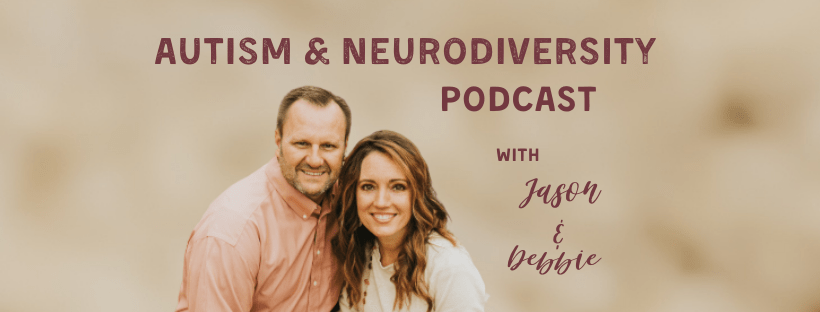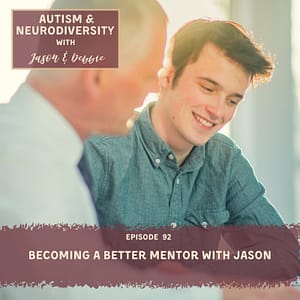[00:03] Speaker B: Welcome to the Autism and Neurodiversity podcast.
[00:06] Speaker A: We’re here to bring you helpful information from leading experts and give you effective tools and support. I’m Jason Gryggla, a licensed counselor and founder of Techie for Life, a specialized mentoring program for neurodiverse young adults.
[00:19] Speaker B: And I’m Debbie Gryggla, a certified life coach. And maybe most importantly, we’re also parent to our own atypical Young Adults.
[00:29] Speaker A: Hello and welcome to the Autism and Neurodiversity podcast. I’m Jason. Today I want to talk to you about mentoring and an aspect of mentoring that we probably haven’t explained in this specific way. And I liked it. It comes from an article and a research topic that was actually done more for teachers in schools and the roles they take on as mentors. And I wanted you to maybe look inside yourself and say, okay, which of these areas am I good at being a mentor? Which areas can I focus on more? And once we shine light on the different roles that a mentor can take, I think we can do a better assessment about am I a whole mentor or am I missing parts of my responsibility and my job? So this publication was done by some researchers in 2022, and it took a lot of teachers and asked them a lot of questions about the type of role they take on as a mentor.
And it broke down mentoring into different factors. And they came up with four of them, and I think they’re pretty valid and valuable to use. And obviously, the coaching mentoring relationship was the goal and how much the student benefited from it was the second part. So the rules jump into it are, one, teachers where they just give information.
Two, friends, where they have fun and just goof around and be comfortable in each other’s presence. That could lead into emotional regulation, acceptance, and a lot of opportunities for building a relationship so that when we talk about harder things, they’re willing to listen.
The third area is supporting nurturing role. When someone’s in pain, how do we nurture and support? How do we give them feedback if they’re hurting, advice? That sort of thing.
And the fourth role is an interesting one that I don’t think we’ve ever talked about. And we are role models as mentors, and I don’t think we’ve ever been proactive in discussing being a role model as a very powerful leg of the table of mentoring.
And so what ultimately motivates teachers in the educational system to be mentors is that there was a strong sense that having a mentor relationship with others gave meaning and accomplishment and that their overall well being and quality of life increased. Now, that didn’t mean that mentoring overcame all of their life issues. A lot of them still said, I still struggle with depression, but it’s lessened or I still have marital problems at home, but I find that I’m more able to attack my other issues because I’m getting the benefit of mentoring and the filling of our cup to be able to give back.
So anyway, let’s go back to those four roles for a second. Teachers give information. Having that be the first thing we talk about probably isn’t the best because in order before you teach someone, they need to know how much you care. And I think that’s a valid principle that no one cares how much you know until they know how much you care. And having them want the information and value the information from you.
I think there needs to be a balance between how much we offer without them asking and letting them come to us and ask is so much more powerful than us dumping a ton of information on them when they’re not looking forward or wanting it. And it turns into such a negative thing that you’re overwhelming them with information that they don’t even have the desire to ask you for advice because they’re constantly trying to just absorb and be patient with the advice you’re giving. So try to balance that. A mentor doesn’t just dump advice all over them. Teaching information and perspective is a part of what mentors do.
I like the friend thing. I think parents who are only friends tend to believe that their job is to give their child what they want. We’ve said it a million times. Our job is to give them what they need, not what they want. And that’s what a true friend does. Friends don’t let friends drink and drive, for example. And so having enough positives so that when we have a hard situation and you can be there in the moment, in that transformative crises and you have such a deep relationship where you can say, I want you to listen to this, I want you to try this, or would you consider sticking it out for these reasons? I really think it will be worth your time. They’ll take that and it’ll be meaningful. And you’ll have influenced their life in one of the hard spots and then the next one being support and nurturing.
And if we’re parents, we don’t have the same dangers of having physical affection. As someone who’s a teacher or coach or therapist, I think you’ll have to figure out what level of hugs is appropriate and what level of intimacy and nurturing is appropriate. For my students at my school, I’m always okay with side hugs when I tell them that. But if they’re crying and they come up and they give me a huge hug because they’re just crying and they’re in their lower brain and they’re childlike, I’m not going to push them away and say, hey, we got to have distance here. I’m going to give them a hug and I’m going to squeeze tight and say, it’s going to be okay. What can I do? I’m here for you. You’re not alone. And I try not to do it alone in my office and as soon as they even show the slightest sign of letting go, I’m off. I don’t linger on that hug. It’s someone who’s had a lot of sexual trauma and they have some borderline tendencies. I’m more careful with that. I may not let them hug me even if they’re in tears. If they’ve accused a bunch of people of sexual abuse in the past, I might need to protect myself.
So be careful how you allow yourself to nurture and support. One of the dangers and probably the most dangerous thing therapists have with their clients is becoming too intimate. And I don’t just mean physical, but very much emotional, where you can have an emotional affair and you’re meeting your needs through them, you can have a physical affair because the emotional affair became so strong and passionate that you just couldn’t help but jump in and be physical with each other. I don’t think that’s common, but I think it’s a risk with anyone who has a big heart and wants to love and be loved. And that is the type of personality that is a good mentor.
We have to be really careful that we don’t meet our needs through the relationship, but we meet our needs through their growth and development, and we meet our needs through helping them find other healthy attachments for the right relationships. For example, I never undermine parents, even though sometimes I don’t agree with what the parents are doing. Or I think there’s a better way. I go out of my way and talk to parents and say, hey, here’s what I think would be better, but I’m not going to undermine you with your teenager or young adult because I always want that person, my mentee, to have their parents in their life. And likely parents are going to be the long term mentors of their child anyway.
So all of those situations take into account when you’re there to support and nurture. I think we know from research that men are more likely to have sexual affairs in marriage and women are more likely to have emotional affairs. And when it’s a man and a woman having an emotional affair and a physical affair, that’s where divorce happens and relationships are broken and destroyed. So keep your mentee mentor relationship safe, keep it appropriate, and if they need lots of hugs, tell them where to go find it. Help them find somebody they can get the physical hugs from instead of us.
All right, so the last one is role model. If you are with your mentee 15 minutes a week, there’s no way you’re going to be a role model in their life. Or maybe if you’re a celebrity and they’re like, oh my gosh, so and so is my mentor and they talk to me on the phone once in a while, I want to be just like them. That’s more like a celebrity issue than a mentor issue. So I’m going to take that out of the equation. To be a role model, we have to be around them enough where they see us in other situations besides just the mentee mentor interaction. And I think being a role model is really important.
I’ve had several students who didn’t have a father in their life, and they needed to have a father role model so that they could work out their issues and see that they’re enough. And I became the healthy male role model in their life that they never had because they never had a father. And it wasn’t that I did anything specific, it’s just that they realized and finally had a way to fill in that hole that I’ve never had a male adult mentor in my life. And so there’s this big unknown, and it’s kind of like playing a guitar with only three strings instead of five or six or seven or eight. Their life is just more enriched when they have different types of mentors.
So being a role model means you have more to do with them than get an ice cream and then drop them off. And being a role model means they see you interact with others and how you handle them, and they hear how you talk about other people. And it means you’re a part of their life enough that they see you in different realms than just the one on one. If you have a temper, if you’re selfish, if you’re worldly, if you’re vain, if you’re narcissistic, if all you care about is money, if you brag, if you’re depressive, if you hate yourself, you are going to rub off on them. And so putting your best foot forward for their sake, it’s probably one of the reasons why mentoring is so fulfilling. It allows us to like who we are because we get to be our best self for someone else’s sake. And it gets us out of our head of am I enough? And all the mess that we can get into in our own lives.
So that’s what I wanted to talk to you about today, is just those four roles and how you’re doing in each of those areas and what does your mentee need more of? Maybe they need more teaching. Maybe they need more nurturing and support. Maybe they need you to be a better role model because there’s nothing you can tell them they’re going to listen to. And maybe you can just be a better friend and have some more fun with them so that they can just take their mind off of all of the hard things in your life at that point.
Good luck in your mentoring. Thank you for being a mentor. I love to be a part of someone else’s development. It brings me a lot of joy, and I think it does you too. So good luck and keep doing good work. Thanks.
[11:32] Speaker B: Thank you for joining us on this episode of Autism and Neurodiversity with Jason and Debbie. If you want to learn more about our work, come visit us JasonDebbie.com. That’s JasonDebbie.com.




